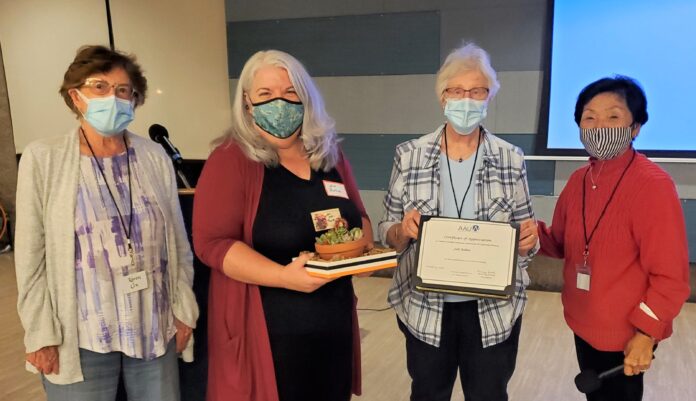
Jodi Balma, Professor of Political Science at Fullerton College in California, came as a guest speaker at the La Palma-Cerritos Branch of the American Association of University Women (AAUW) on Thursday, October 21, 2021, at the La Palma-Community Center in La Palma. Professor Balma is also an active member of the League of Women Voters of North Orange County.
She came prepared with her laptop computer and a Power Point Presentation with statistical information about Voter Suppression and Restrictions on the Right to Vote. She is an excellent speaker and showed why she has been selected as Fullerton College’s Outstanding Teacher in 2021, and one of six Outstanding Teachers selected by the Orange County Department of Education for 2022.
Professor Balma began by saying that five of the 27 Amendments to the United States Constitution dealt with protecting voter rights for U.S. citizens. They are Amendments 15, 19, 23, 24, and 26.
Amendment 15 prohibits denial of the right to vote based on race, color, or previous servitude.
Amendment 19 prohibits denial of the right to vote based on sex.
Amendment 23 grants the District of Columbia electors in the Electoral College.
Amendment 24 prohibits revocation of voting rights due to non-payment of a poll tax or any tax.
Amendment 26 prohibits denial of voting by U.S. citizens of 18 years of age and older because of age.
In spite of the prohibitions by these amendments to protect the voting rights of U.S. citizens, there are still problems that can still exist when state governments create their own laws regarding voting in their states.
After the Supreme Court rulings in Shelby County v. Holder (2013), and Brnovich v. the Democratic National Committee (2021), suppression did occur in 2012-2016 when people who had not voted in the last election were purged. In Texas, two million voters were purged after the Shelby ruling, and in Georgia, 1.5 million voters were purged. Some other state laws made it harder for people of color, poor people, and young people to vote.
Purges occurred under both Democrats and Republicans. Both parties also used re-districting with gerrymandering to their parties’ advantage in the past and continue to do so in the present.
Professor Balma said that citizens in the United States need to feel that each vote is important and believe in voter efficacy that each vote will count. According to the Joint Statement from the Elections Infrastructure Government Coordinating Council and the Election Infrastructure Sector Coordinating Executive Committees, the November 3, 2020, election was “the most secure election in American history,” with only 491 cases of absentee ballot fraud, or 0.00000044% of billions of ballots cast. Voter integrity was achieved with mail-in ballots, ballot tracking, signatures of voters required, text notification of votes received, secure drop off locations, voting centers in cities, and post-election audits.
Balma gave two examples of restrictions for some citizens that may stop them from exercising their right to vote by state law. 1) If a state requires that a driver’s license be used as the required form of identification and the person does not have a driver’s license, that person may not be allowed to vote. 2) If a native American does not have a mailing address for his home, and only has a P.O. Box address, that person may also not be allowed to vote. Professor Balma said that there is new act that is being considered by Congress that would restore provisions of the Voting Rights Act of 1965.
According to Wikipedia, the law that is being considered is the John Lewis Voting Rights Advancement Act of 2021 (H.R.), in honor of the late Georgia Representative and voting right activist, John Lewis. If this proposed law is passed, it would restore and strengthen the Voting Rights Act of 1965 that required preclearance by the Federal government of changes to voting laws and expand control over changes in state voting laws. The House of Representatives passed this law on August 24, 2021, but it still needs approval by the Senate, and a signature by President Biden.
Professor Balma encouraged everyone to protect their right to vote and vote at every election.
For more information, contact Program Co-VP Karen Cox at 562-519-0596.
